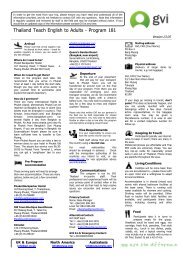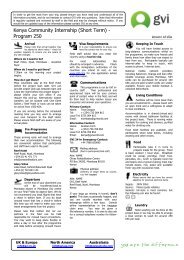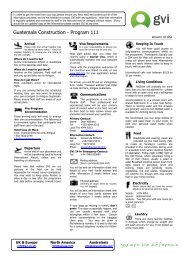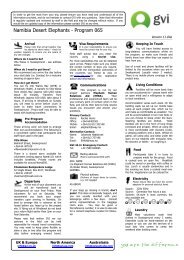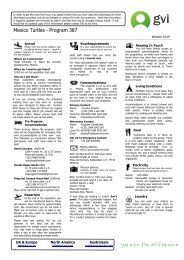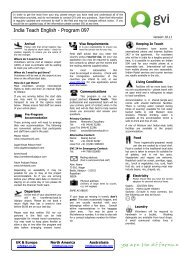Ratu Meli Memorial School
Ratu Meli Memorial School
Ratu Meli Memorial School
You also want an ePaper? Increase the reach of your titles
YUMPU automatically turns print PDFs into web optimized ePapers that Google loves.
Fiji Education Training Manual<br />
Version 1.1
Table of Contents<br />
WELCOME ................................................................................................................................. 2<br />
OUR PARTNERS........................................................................................................................ 3<br />
INTRODUCTION TO FIJI AND THE YASAWA ISLANDS ........................................................... 4<br />
FIJI EDUCATION SYSTEM BACKGROUND .............................................................................. 5<br />
SCHOOL PROFILE: RATU MELI MEMORIAL SCHOOL (RMMS).............................................. 6<br />
TEACHING AT RATU MELI MEMORIAL SCHOOL: SAMPLE PROGRAM SCHEDULE ............ 9<br />
GETTING STARTED................................................................................................................. 11<br />
INTRODUCTION TO LESSON PLANNING............................................................................... 13<br />
TEACHING TIPS & ADVICE ..................................................................................................... 16<br />
FINAL THOUGHTS ................................................................................................................... 17<br />
APPENDIX................................................................................................................................ 18<br />
CULTURAL INFORMATION ..................................................................................................... 18
Fiji Education<br />
Welcome<br />
Congratulations!<br />
If you are reading this you have enrolled on an extremely rewarding and important<br />
volunteering program which will enable you to have a direct positive impact on the lives<br />
of Yasawan villagers.<br />
We would like to begin by thanking you in advance. GVI Fiji and the local children are<br />
looking forward to your arrival and the time we will spend together.<br />
Teaching and working with children is hard work both physically and mentally but it is also<br />
extremely rewarding. The more effort and energy you put in the more you and your<br />
students will take from it. We sincerely hope this will be a fun and very rewarding<br />
experience for you. However, in turn we must all keep in mind that the main focus of this<br />
project is to improve the lives of these children and their communities by working to<br />
improve education standards. Through positive and productive interaction with students<br />
we can achieve our ultimate goal, which is to enable them to have greater opportunities<br />
later in life.<br />
We don’t ever want you to feel that you are alone in this program. The majority of our<br />
volunteers participating on our GVI teaching projects have little or no experience working<br />
with children in a classroom setting. Field staff will be available during planning time and<br />
the lessons themselves, to assist you in any way we can. We also encourage you to work<br />
with your fellow volunteers to give each other support and reassurance, which can be can<br />
be much appreciated at times.<br />
We appreciate any constructive feedback you can give us during specified feedback<br />
sessions. We hope we can all work together to improve things where necessary and make<br />
this program as successful and effective as possible.<br />
The following training manual will introduce you to some basic concepts regarding the<br />
project, your role as a teacher, teaching methodologies and cultural tips. Once on base,<br />
GVI staff will provide training sessions to prepare you with the necessary knowledge<br />
required to effectively plan lessons, have a hand in classroom management, ways to<br />
promote self-esteem and the different approaches we can utilize to create a thriving,<br />
nurturing environment for our students. It is not necessary to print the following, although<br />
we do ask you to read it carefully. Should any questions arise, please feel free to discuss<br />
these with the field staff during your training sessions. As mentioned above, the majority of<br />
our volunteers have never taught before and we look forward to providing you with all the<br />
necessary training and resources for you to become a successful teaching assistant.<br />
Finally, we would like to wish you good luck and thank you again for your participation in<br />
this program.<br />
Vinaka Vaka Levu,<br />
GVI FIJI<br />
2
Fiji Education<br />
Our Partners<br />
Global Vision International supports numerous NGO’s and organizations around the<br />
world providing the human resources required to run critical community development and<br />
conservation projects.<br />
GVI was contacted by The Yasawa Trust Foundation in 2010 with a request to help<br />
assist the Trust in the implementation of a broad community development and<br />
infrastructure improvement project. The Trust was established to help the Villagers of the<br />
Yasawas to improve their access to fresh drinking water, to improve the availability and<br />
implementation of sustainable power solutions, to improve the quality of local education,<br />
and to improve the general health of villagers through education schemes and<br />
agricultural initiatives. As a GVI volunteer in Fiji you are both a representative of GVI and<br />
The Yasawa Trust Foundation.<br />
3
Fiji Education<br />
Introduction to Fiji and The Yasawa Islands<br />
Fiji, a country most commonly associated with notions of ‘paradise’ has its share of socioeconomic,<br />
political, and cultural problems. Over the years there have been a number of<br />
political coups and most recently in 2002 the military overthrew the elected government<br />
and took power. Currently, the country is a stable military dictatorship. The government is<br />
now well established and the people of Fiji are more or less content with the current<br />
situation. Although Fiji continues to be a safe, friendly, and beautiful destination,<br />
economically the island nation has suffered. This economic decline has restricted the<br />
government’s ability to address countrywide infrastructure problems.<br />
The Yasawa Island group is an<br />
archipelago made up of over 20<br />
volcanic islands that lie to the west<br />
of Viti Levu, mainland Fiji. The<br />
villages of the Yasawas are basic<br />
traditional Fijian settlements with<br />
limited sources of income. The<br />
relatively new influx of tourism to<br />
the area has provided some<br />
restricted financial benefits for<br />
certain villages in proximity to the<br />
basic resorts, though overall most<br />
villages lack a dependable means<br />
of income. The people of the<br />
Yasawas depend on both the land<br />
and sea for subsistence. Their<br />
lives are inextricably linked to the<br />
environment and their natural<br />
resources. As a result, the<br />
importance of protecting these<br />
resources through sustainable<br />
management is crucial to Yasawan<br />
life.<br />
Ferry Route to Tovuto Base – GVI’s field base lies 4.5-5hours from the<br />
mainland via ferry<br />
One of the most important aspects of community development work is education.<br />
Through education children are empowered and given the ability to shape their lives and<br />
the lives of others. We aim to broaden opportunities for the children in the future and as<br />
an education volunteer you are a valuable asset to this process.<br />
4
Fiji Education<br />
Fiji Education System Background<br />
In recent years, significant progress towards the improvement of the quality of education<br />
provided in Fiji’s schools has been made. Education in Fiji is compulsory and as a result<br />
they have a high literacy rate of 93%.<br />
Various education policies have been passed to help facilitate greater access to education<br />
for all children and youths, especially in the rural areas.<br />
Although the Education System is directed by the Government, many schools are<br />
managed by local communities, as well as private schools operated by individual groups or<br />
by missions under government supervision. All Government <strong>School</strong>s teach in English.<br />
Despite the continuing efforts of the Ministry of Education, conditions are still not ideal and<br />
there are always areas for improvement, especially when it comes to assisting teachers in<br />
the classrooms and providing tutorial sessions for the students. The education the children<br />
receive is often very generic and fails to provide them with a sufficient understanding of the<br />
curriculum. In addition to this there is an inequality between the quality of teaching and<br />
resources available at mainland schools compared to island schools. By providing support<br />
to the teachers and educational resources that would otherwise be unavailable we hope to<br />
reduce this inequality.<br />
5
Fiji Education<br />
<strong>Ratu</strong> <strong>Meli</strong> <strong>Memorial</strong> <strong>School</strong> (RMMS)<br />
The <strong>Ratu</strong> <strong>Meli</strong> <strong>Memorial</strong> <strong>School</strong> is a Government <strong>School</strong> run by the community committee.<br />
It is affiliated with the Fijian curricula, so the classes are in English. However, because<br />
most students do not speak English at home many of the children are quite shy about<br />
speaking English and have a vocabulary less developed than children from the mainland.<br />
There are currently 125 students enrolled at <strong>Ratu</strong> <strong>Meli</strong> <strong>School</strong>, both boys and girls, from<br />
class 1-8. The students are from Nacula Village, and from the other villages on Nacula<br />
Island: Naisisili, Navotua and Malakati. Due to the distances between their home village<br />
and the school, approximately 60 students board at the school alongside the eight<br />
teachers.<br />
Your assistance will not only greatly help the over-worked teachers but<br />
it will also enrich the educational experience that the children have at<br />
school.<br />
Many of the children are great students but do not test well because they struggle with<br />
English language. As a GVI volunteer one of our main goals is to reduce this apprehension<br />
and develop their abilities within a multitude of scholastic subjects. In order to be<br />
successful in our efforts we must always take into consideration the background of our<br />
student population and the obstacles these children may face in their daily life. The<br />
students are excited to be taught by a foreigner and will work hard to impress you.<br />
6
Fiji Education<br />
At GVI Fiji our aim is to improve<br />
literacy and numeracy levels at<br />
RMMS, as well as facilitating creative<br />
and physical development.<br />
Through classroom assistance, additional<br />
educational resources and increased exposure<br />
to English speakers we aim to improve the<br />
confidence of pupils at RMMS and in doing so<br />
broaden their opportunities in the future.<br />
As a volunteer you will be involved in assisting<br />
local teachers across all subjects, as well as<br />
supervising and interacting with the children. At<br />
RMMS lessons are often taught with just a<br />
blackboard and chalk, which is uninspiring and<br />
does not promote learning. Volunteers are able<br />
to assist the teachers in creating a stimulating<br />
learning environment, motivating the students<br />
to learn.<br />
In addition to supporting teachers in<br />
academic subjects, such as English,<br />
Math and Science, GVI volunteers are<br />
also responsible for Music, Physical<br />
Education and Art lessons. Although<br />
these subjects are included in the<br />
timetable at RMMS, they are frequently<br />
overlooked and by delivering these<br />
lessons ourselves we are hoping to<br />
facilitate the creative and physical<br />
development of the pupils. You will also<br />
have the opportunity to get involved<br />
with the one-on-one tuition program<br />
which was introduced by GVI to provide<br />
additional support to those pupils who<br />
are struggling.<br />
As a volunteer you will influence the lives of young children and even if<br />
you have never worked with children before you can and will have a<br />
major impact.<br />
7
Fiji Education<br />
Holiday <strong>School</strong> Program<br />
Three times a year RMMS closes its doors for the holidays and during this time GVI<br />
volunteers tour around the nearby islands visiting the children in their villages for ‘holiday<br />
club’. This has proven to be a hugely popular event as the children have limited<br />
entertainment in their villages during the holidays. Lots of fun is had all round as<br />
volunteers help the children to try lots of exciting new activities and also practice their<br />
English outside of the classroom. As a volunteer you will gain a unique insight into village<br />
life and have the opportunity to explore the islands.<br />
8
Fiji Education<br />
9<br />
Teaching at <strong>Ratu</strong> <strong>Meli</strong> <strong>Memorial</strong> <strong>School</strong>: Sample<br />
Program Schedule<br />
First Week<br />
Arrival Saturday: Arrival Health &<br />
Safety briefing and welcome<br />
orientation in Nadi, followed by travel<br />
to GVI Tovuto Base in the Yasawas.<br />
On arrival you will receive a base tour<br />
and a welcome presentation before<br />
settling in to your new home.<br />
Arrival Sunday: On Sunday you will<br />
complete all health and safety<br />
training, as well as receiving a cultural<br />
orientation presentation. Finally, you<br />
will be given project training, including<br />
Arrive at Tovuto base<br />
an introduction to <strong>Ratu</strong> <strong>Meli</strong> <strong>Memorial</strong><br />
<strong>School</strong>, life on the project, lesson<br />
planning advice and class management tips. You will also be assigned to a class and<br />
given your ‘class folder’ with lots of helpful information to get you started.<br />
Arrival Monday: First day on project and when the fun really begins! You will be<br />
introduced to the school during assembly before heading to your classroom where you<br />
can start to get to know your teacher and pupils. The first day is just for settling in so no<br />
need to worry!<br />
Welcome Assembly<br />
Rest of the Week: You will be assisting the<br />
teachers in the classrooms and participating<br />
in GVI’s initiatives at the school. Each week<br />
you will have a checklist of tasks that you<br />
will be responsible for completing in your<br />
classroom.<br />
In the evenings there will be time for lesson<br />
planning, chores and social/cultural activities<br />
organized by field staff and volunteers, all<br />
suggestions welcome! You will also have<br />
daily briefings on base and at school with<br />
field staff and volunteers to discuss how<br />
your week is going and any other issues that<br />
arise.<br />
Weekends: Free time! You can go island hopping, scuba diving, snorkeling, kayaking or<br />
just relax in the most beautiful white sand beaches. Let field staff know in advance if you<br />
plan to book any side trip.
Fiji Education<br />
Final Week<br />
Monday – Thursday - full days on the project<br />
Departure Friday: - Leaving presentation for departing volunteers and the opportunity to<br />
give your feedback on the program. You will then depart to the mainland, arriving in Nadi in<br />
the evening where you will go for a departure meal.<br />
Daily Schedule<br />
Please note this is a general guide and is subject to ‘Fiji Time’<br />
(sometimes at short notice, so it’s very important to be flexible)<br />
7:00-7:30 Breakfast<br />
7:50 Load boat and get ready to deploy<br />
8:00 Departure<br />
08:30 Arrival at RMMS<br />
08:30 – 12:00 Teaching and assisting in classrooms<br />
12:00 – 13:00 Lunch<br />
13:00 – 15.00 Teaching and assisting in classrooms<br />
15:00 - 15:15 Debrief & Deploy to base<br />
15:45 Arrive at Tovuto Base<br />
16:30 – 19:00 Lesson planning/ Base chores / Free time<br />
19:00 ish Dinner<br />
10
Fiji Education<br />
Getting Started<br />
Class Folders<br />
At the end of your project training you will be assigned to a class and presented with<br />
your ‘class folder’. This is valuable a resource which you can use to find out in depth<br />
information about your class. Inside there will be examples of lesson plans, profiles of<br />
the pupils and helpful information/tips left for you by previous volunteers. Look after your<br />
folder and remember to update it so that future volunteers can continue to build on the<br />
progress you made in the classroom.<br />
Your First Day<br />
Getting to know your students is very<br />
important in your first week this will help<br />
you to settle into your classroom. Your<br />
first day may seem overwhelming at<br />
times. Keeping busy and getting<br />
involved straight away is a great way to<br />
start things off. Making a seating chart is<br />
a way to get acquainted with your class.<br />
After you have done this make an effort<br />
to speak to each child one-on-one. Ask<br />
them their name, age, about their<br />
brothers or sisters, etc. Also make an<br />
effort to speak with your local teacher<br />
and the other teachers in the school.<br />
Starting the Day<br />
Greeting Students: a warm personal<br />
welcome sets the tone for the day and gives the teacher a chance to assess each<br />
student’s mood.<br />
Introductory Activity: you can settle your students down as they enter the classroom by<br />
involving them immediately with an activity. It could be a math problem on the board,<br />
vocabulary lists that the students can define with a dictionary, drawing or passing out a<br />
map template asking students to locate certain countries/cities or a simple cut and paste<br />
activity.<br />
Don’t waste your time<br />
Your time as a volunteer is precious and you need to take advantage of every minute.<br />
Always be sure that your lessons and activities are prepared and rehearsed the night<br />
before. A teacher that is rushing around trying to prepare materials during class time will<br />
never have success in meeting their objective of the lesson and will lose the attention of<br />
the students. Make sure that if you are doing an arts and crafts project to always do a<br />
11
Fiji Education<br />
trial run outside of school to realize the difficulties you may encounter when you try it with<br />
your students. If the activity involves various steps or stages make sure you have<br />
examples to show the children what the project should look like for each step. The<br />
students will nod as if they understand even when they don’t. Ask concept-checking<br />
questions to make sure they understand e.g. what did we just do? Why did we do this?<br />
Give examples to explain concepts or words.<br />
Use simple language and speak clearly<br />
Remember a concept that you consider to be simple may be lost in translation. Be patient<br />
and if they don’t understand something, try to rephrase it. The Fijian teachers will also be<br />
on hand to help translate if necessary. Also be wary of your accent when helping the pupils<br />
with pronunciation.<br />
Tips on Volunteer Conduct<br />
It is important to be culturally aware at all times whilst in the school and<br />
villages<br />
Always dress appropriately. Try to wear your GVI t-shirt, if it is being<br />
washed ensure you have a suitable substitute (see appendix on cultural<br />
information)<br />
Address the students and teachers politely – it is important to offer a word of<br />
greeting so say Bula to whomever you meet in your day-to-day activities.<br />
Always set a good example to teachers and pupils - strive to be punctual,<br />
organized and enthusiastic<br />
Be friendly and make an effort to get to know the teachers and student<br />
Try to include examples from local culture in lessons, this will help the<br />
student understand<br />
12
Fiji Education<br />
INTRODUCTION TO LESSON PLANNING<br />
Teachers at every level prepare plans that aid in the organization and<br />
delivery of their daily lessons. Teachers need more than a vague notion<br />
of what they plan to bring into the classroom. The effective teacher<br />
needs to develop a plan to provide direction toward the attainment of<br />
their objectives. The more organized a teacher is, the more effective the<br />
teaching will be.<br />
<strong>Ratu</strong> <strong>Meli</strong> <strong>Memorial</strong> <strong>School</strong> follows<br />
the national curriculum and we have<br />
copies of all the generic textbooks<br />
available for you to use. Building a<br />
relationship with your teacher is<br />
crucial for effective lesson planning.<br />
When you arrive, ask what they<br />
would like you to contribute and<br />
continue to do so throughout your<br />
time in the classroom. Each week the<br />
local teachers complete a planner<br />
which details all their lessons for the<br />
following week. Use this to help plan<br />
with your teacher so that you have<br />
time to prepare in advance.<br />
Try to use the local teachers lesson<br />
plans for the first few days until you<br />
are comfortable. It is important that<br />
you follow this guideline, as students have to sit exams in school that are based on the<br />
local curriculum. Whenever possible try to use your own skills and creativity, as well as our<br />
educational resources to plan lessons which are in keeping with the local curriculum but<br />
are stimulating and motivating for the pupils. Your class folder will include examples of past<br />
lesson plans and feedback from former volunteers - use this at all times for reference.<br />
If you have any questions, need assistance or anything is unclear please speak to your<br />
staff.<br />
Good preparation gives the teacher time to be effective and proactive. If<br />
you are unprepared when you enter the classroom the pupils will pick<br />
up on this very quickly and test you. You should always have all<br />
materials needed for your class, instructions on the board and a<br />
concept of how you will introduce your lesson to the students.<br />
13
Fiji Education<br />
A well-prepared volunteer is confident and in control; this sets the tone for your lesson.<br />
The prepared volunteer always has a few minutes to set up the lesson for their next class.<br />
Being a proactive teacher involves setting rules and guidelines for your class to follow. A<br />
sample of class rules:<br />
<br />
<br />
<br />
<br />
<br />
<br />
Come to class prepared and on time<br />
Be respectful of your fellow classmates<br />
Pay attention during instructions<br />
Do your homework.<br />
Keep your classroom clean<br />
Raise your hand<br />
Education Resources<br />
Before planning your lessons have a rummage<br />
through our educational resources to get ideas for<br />
new activities in the classrooms. At RMMS we<br />
have a GVI room full of education resources<br />
including books, teaching guides, reference<br />
books, arts and craft materials, sports equipments<br />
and stationary. There are plenty of tools to help<br />
you make lessons more exciting and stimulating<br />
for the pupils and they are there for you to use so<br />
don’t hesitate to incorporate them into your<br />
lessons.<br />
GVI resources<br />
room<br />
Some Ideas<br />
<br />
<br />
<br />
<br />
<br />
The majority of lessons are taught on blackboard which is repetitive and uninspiring.<br />
Be creative with your delivery and show the pupils that learning can be fun.<br />
Keep the curriculum in mind when planning lesson to ensure you are achieving<br />
the learning objectives set by the teacher.<br />
Start with a warm up activity. Before you present the main part of your lesson,<br />
set the stage for your students by tapping into their prior knowledge and giving the<br />
objectives a context.<br />
There are many resources and materials available- use them to help plan<br />
your lessons<br />
Students learn in different ways and react better to different activities so try to<br />
incorporate a variety of learning styles into your lessons<br />
14
Fiji Education<br />
<br />
<br />
<br />
<br />
<br />
<br />
Use the Class Folders to find examples of past lesson plans which were<br />
successful<br />
Lesson plan with fellow volunteers, it is easier and more enjoyable if done as a<br />
group - giving suggestions, brainstorming ideas or helping each other to make<br />
materials.<br />
Guided learning is important. Under your supervision, the students are given a<br />
chance to practice and apply the skills you taught them and demonstrate their<br />
understanding.<br />
Always try to have a plan B. Volunteers should have a couple of activities planned<br />
for the lesson or at least a back-up activity in case the lesson is over more quickly<br />
than anticipated. Also consider higher level students who may finish quicker.<br />
How do you conclude your lesson? Can it be extended for a homework<br />
assignment? Volunteers giving one-to-one lessons are allowed to give the students<br />
some homework if deemed appropriate<br />
Test the pupils to ensure they have understood the lesson. The assessment<br />
section is one of the most important parts of all. Give quizzes, tests, verbal exams,<br />
assign homework, etc. Students should be able to demonstrate the skills you have<br />
taught. Assessments show volunteers how effective their teaching methods have<br />
been and also help to identify the different levels of the pupils.<br />
15
Fiji Education<br />
TEACHING TIPS & ADVICE<br />
From discussion with teachers, volunteers and our coordinators we have devised a list of<br />
general tips for you to consider when planning and teaching your lessons. This is by no<br />
means an exhaustive list and it is still a work in progress so we would appreciate your<br />
feedback on anything that you feel could be added to make lessons more successful and<br />
less stressful.<br />
<br />
<br />
<br />
<br />
<br />
<br />
<br />
<br />
<br />
Be positive with verbal and body<br />
language. You being optimistic and<br />
smiling will reflect your personality<br />
and the children will be more<br />
receptive to a cheerful and happy<br />
volunteer.<br />
Learn your students names ASAP!<br />
Get to know your children and<br />
develop a relationship with them<br />
straight away.<br />
Be patient. Always give students<br />
an opportunity to answer a question<br />
(Waiting Time).<br />
Equality is essential. All students<br />
should receive the same amount of<br />
attention from the volunteers. Avoid<br />
favouritism.<br />
Don’t be afraid to ask. GVI staff is<br />
going to be around for you during your training and during classroom time.<br />
Always remain calm. It is easy to become frustrated or overwhelmed with your<br />
duties. Students will catch on to this and it will make it more difficult to manage the<br />
class. Never raise your voice, scold, embarrass or be sarcastic with your students.<br />
Have a schedule of activities and establish a routine. Children need structure.<br />
Plan daily activities or daily starters/openers that settle your students and give them<br />
a sense of order.<br />
Make sure your lessons involve all students. Plan your activities with the idea that<br />
you need all students to participate.<br />
Project your voice. Make sure it is heard, it is clear and not too fast. This shows<br />
leadership and confidence.<br />
16
Fiji Education<br />
<br />
<br />
<br />
<br />
<br />
<br />
<br />
<br />
Be presentable. You don’t need to dress up, but make sure you are well rested<br />
and are wearing appropriate<br />
clothing.<br />
Always be punctual. Maintain<br />
your schedule; this will aid in your<br />
lesson plans and the structure of<br />
your classroom.<br />
Communicate with the school’s<br />
local teachers. Building a<br />
relationship with your teachers will<br />
give you a better understanding of<br />
your class and the lessons you are<br />
planning.<br />
Always be courteous. Be sure to<br />
greet local school staff and community members you encounter when on the<br />
project.<br />
Interact with students during break time or recess. Make the experience fun for<br />
yourself and the students even when outside the classroom.<br />
Learn the local language. Use phrases the children can relate to.<br />
Strive to be helpful. Always assist in classroom duties. (Clean-up, organizing<br />
materials, supervising the children).<br />
Utilize all the resources that are available to you (local teachers’ notes,<br />
curriculum books, and most importantly your own ideas and creativity!)<br />
Have fun! Volunteers should enjoy their role, being able to<br />
work with the teachers and pupils at RMMS is the experience<br />
of a lifetime. Make the most of it!<br />
Final Thoughts<br />
We hope that you have found these introductory materials informative and the prospects<br />
exciting. The Yasawa Islands are home to some of the most idyllic natural beauty in the<br />
South Pacific and we know that you will find your time in the villages both rewarding and<br />
enjoyable. Thank you for joining us and making this program possible.<br />
See you in the Pacific!<br />
GVI Fiji<br />
17
Fiji Education<br />
Appropriate Dress<br />
APPENDIX<br />
CULTURAL INFORMATION<br />
In the villages, women must cover their shoulders and legs at all times. It is perfectly fine<br />
to wear short sleeved shirts as long as shoulders are covered. It is acceptable for<br />
volunteers to wear long work trousers during construction work though during all other<br />
times women should wear sarongs. Men should wear sarongs and short sleeved shirts at<br />
school and to village functions but at other times it is acceptable to wear trousers or<br />
shorts. Volunteers, when teaching at the school, should plan to wear sarongs and either<br />
a short-sleeve t-shirt/polo shirt or the GVI Fiji t-shirt (provided on arrival) to school every<br />
day. On base, volunteers are free to wear what they wish.<br />
It is possible to purchase traditional clothing before deploying to the islands. For women<br />
this would be a Sulu Chamba<br />
which is a patterned sarong and<br />
matching fitted top. Men wear<br />
Sulu’s (sarongs) and what is<br />
referred to as a ‘bula shirt’ – a<br />
colourful patterned, short sleeved<br />
button up shirt, similar to what<br />
many refer to as a ‘Hawaiian<br />
shirt’.<br />
Please do not wear hats in the<br />
village. Traditionally only<br />
headmen and chiefs are allowed<br />
to wear headwear.<br />
Fiji Facts:<br />
18<br />
Fiji is comprised of approximately 540 islets and 322 islands of which about 100<br />
are inhabited. The majority of these islands were formed through volcanic activity<br />
around 150 million years ago.<br />
Fiji has a small population of approx 846,000 people<br />
The biggest island is Viti Levu which is home to the capital of Fiji, Suva and also<br />
Nadi Town which is where the main international airport is located.<br />
The most popular religion is Christianity followed by Hindi and Muslim<br />
Fiji has a tropical climate and experiences a cyclone season between November-<br />
April.
Fiji Education<br />
<br />
<br />
<br />
Indigenous Fijians still follow their traditional rites and practices, which<br />
include mekes (narrative dances), and the ceremonial drinking of yaqona (kava<br />
ceremonies).<br />
Rugby is the most popular sport in Fiji and the national team is very successful<br />
given the size of the population<br />
The biggest industries are Tourism and sugar<br />
Say it in Fijian<br />
Hello – Ni Sa Bula<br />
Hello (informal) – Bula<br />
Goodbye – Moce (Mo-th-e)<br />
Yes – io<br />
No – Sega (S-eng-a)<br />
Please – Kere Kere<br />
Thank you – Vinaka<br />
Thank you very much – Vinaka vaka levu<br />
Good morning – Yadra (Y-an-dra)<br />
See you again – Sota Tale<br />
No worries – Sega na lega (s-eng-a n al l-eng-a)<br />
19
Fiji Education<br />
20



